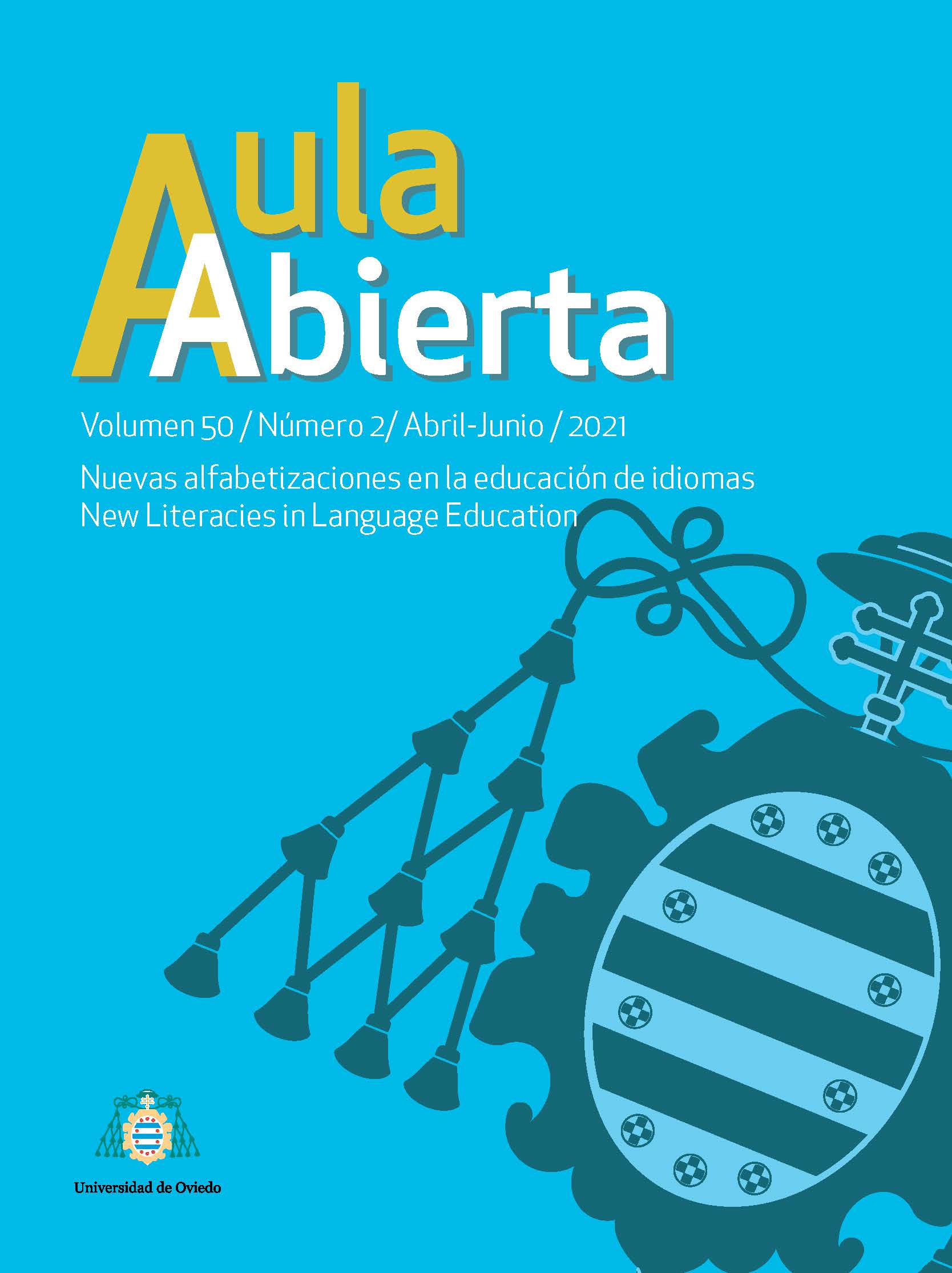Resumen
Las denominadas “competencias del siglo XXI” (Dudeney, Hockly y Pegrum, 2014) se identifican como una alfabetización esencial para las nuevas generaciones, que deben utilizarlas (por ejemplo, creatividad, innovación, colaboración, pensamiento crítico o autonomía) para funcionar eficazmente. Los maestros bilingües en formación deben desarrollar estas competencias tanto para su propia educación como para la de sus futuros alumnos (Savage y Barnett, 2015). Esta investigación analizará las opiniones de estos sujetos sobre si el desarrollo de dichas competencias es más adecuado a través de la docencia presencial o virtual. Los datos se examinarán mediante una investigación de métodos mixtos, que arrojará luz sobre cómo los participantes consideran que se desarrollan mejor dichas competencias. Los resultados mostrarán que algunas de esas habilidades evolucionan más favorablemente a través de una modalidad presencial (por ejemplo, el trabajo en equipo y la colaboración), mientras que otras (por ejemplo, la autonomía y la innovación) lo hacen mejor online. La alfabetización del siglo XXI amplía los límites educativos de los maestros bilingües, ya que deben disponer de un amplio repertorio de competencias comunicativas que hace que los formadores de maestros persigamos el rigor académico en lo que respecta a nuestra propia enseñanza en el aula y formación actualizadas.
Citas
Aliyyah, R. R., Rachmadtullah, R., Samsudin, A., Syaodih, E., Nurtanto, M., & Tambunan, A. R. S. (2020). The perceptions of primary school teachers of online learning during the COVID-19 pandemic period: A case study in Indonesia. Journal of Ethnic and Cultural Studies, 7(2), 90–109.
Alonso-Díaz, L., Delicado, G., & Ramos, F. (2019). A Comparative Study of Bilingual Teacher Preparation Programs in California and Spain. In B. Johannessen (ed.), Bilingualism and Bilingual Education: Politics, Policies and Practices in a Globalized Society (pp. 81–101). Cham: Springer.
Álvarez, M. D. L. C. & Domenech Rodríguez, M. M. (2020). Cultural competence shifts in multicultural psychology: Online versus face-to-face. Translational Issues in Psychological Science, 6(2), 160.
Campo-Arias, A. & Oviedo, H. C. (2008). Psychometric properties of a scale: internal consistency. Revista de salud pública, 10(5), 831–839.
Castaman, A. S. & Rodrigues, R. A. (2020). Educação a Distância na crise COVID-19: um relato de experiência. Research, Society and Development, 9(6), e180963699–e180963699. Retrieved from https://cutt.ly/0jWiznZ.
Creswell, J. W. & Plano Clark, V. L. (2010). Designing and conducting mixed methods research (2nd edition). London: Sage Publications.
Creswell, J. W., Klassen, A. C., Plano Clark, V. L., & Smith, K. C. (2011). Best practices for mixed methods research in the health sciences. Bethesda (Maryland): National Institutes of Health.
Day, T., Chang, I. C. C., Chung, C. K. L., Doolittle, W. E., Housel, J., & McDaniel, P. N. (2021). The immediate impact of COVID-19 on postsecondary teaching and learning. The Professional Geographer, 73(1), 1–13.
Denzin, N. K. & Lincoln, Y. S. (Eds.). (2017). The SAGE Handbook of Qualitative Research (5th ed.). Thousand Oaks, CA: SAGE.
Dudeney, G., Hockly, N., & Pegrum, M. (2014). Digital literacies. New York: Routledge.
Hantrais, L., Allin, P., Kritikos, M., Sogomonjan, M., Anand, P. B., Livingstone, S., Williams, M., & Innes, M. (2020). Covid-19 and the digital revolution. Contemporary Social Science, 1–15.
Hasan, N. & Bao, Y. (2020). Impact of “e-Learning crack-up” perception on psychological distress among college students during COVID-19 pandemic: A mediating role of “fear of academic year loss”. Children and Youth Services Review, 118, 105355.
Hung H-L., Altschuld, J. W., & Lee, Y. (2008). Methodological and conceptual issues confronting a cross-country Delphi study of educational program evaluation. Evaluation and Program Planning, 31, 191–198.
Hsu, C. C. & Sandford, B. A. (2007). The Delphi technique: making sense of consensus. Practical assessment, research & evaluation, 12(10), 1–8.
Kauppi, S., Muukkonen, H., Suorsa, T., & Takala, M. (2020). I still miss human contact, but this is more flexible—Paradoxes in virtual learning interaction and multidisciplinary collaboration. British Journal of Educational Technology.
Kumari, V., Hameed, D., Mazumder, D., & Sathyan, A. (2020). The Role of Education Leadership in Managing Teaching Competencies of Selected Secondary Teachers in the United Arab Emirates (UAE) (An Exploratory Study). International Journal of Management (IJM), 11(9).
Landeta, J. (2006). Current validity of the Delphi method in social sciences. Technological forecasting and social change, 73(5), 467–482.
Lee, K. (2020). Openness and innovation in online higher education: A historical review of the two discourses. Open Learning: The Journal of Open, Distance and e-Learning, 1–21.
LOMCE. (Ley Orgánica 8/2013, de 9 de diciembre, para la mejora de calidad educativa). (2013). Jefatura del Estado. BOE, 295. Retrieved from https://cutt.ly/bjWuf7G.
Martin, A. (2006). Digital Literacy Needed in an ‘e-permeated’ World: Progress Report of DigEuLit Project. Retrieved from https://cutt.ly/Pjm06s3.
Nayernia, A. (2020). Development and validation of an e-teachers’ autonomy-support scale: A SEM approach. Development, 14(2), 117–134.
OECD. (Organisation for Economic Cooperation and Development). (2013). Assessment of higher education learning outcomes. AHELO Feasibility Study Report Vol. 3–Further Insights. Retrieved from https://cutt.ly/LjWnJIn.
Oviedo H. C. & Campo-Arias, A. (2005). Aproximación al uso del coeficiente alfa de Cronbach. Revista colombiana de psiquiatría, 34(4), 572–580.
P21. (Partnership for 21st Century Skills). (2007). Framework definitions. Retrieved from https://cutt.ly/VjmBqzI.
Savage, M. & Barnett, A. (2015). Digital Literacy for Primary Teachers. Critical Teaching. Northwich: Critical Publishing.
Sun, C., Shute, V. J., Stewart, A., Yonehiro, J., Duran, N., & D’Mello, S. (2020). Towards a generalized competency model of collaborative problem solving. Computers & Education, 143, 103672.
Takala, M., Nordmark, M., & Allard, K. (2019). University curriculum in special teacher education in Finland and Sweden. Nordic Journal of Comparative and International Education (NJCIE), 3(2), 20–36. DOI: https://doi. org/10.7577/njcie.2659.
The Jamovi Project (2020). Jamovi. (Version 1.2) [Computer Software]. Retrieved from https://www.jamovi.org.
Vitalaru, B. (2020). Competences in US and Spain: Skills and Strategies in LAs’ Spanish Academic Papers. In M. E. Gómez-Parra and C. A. Huertas-Abril (Eds.), Handbook of Bilingual and Intercultural Education (pp. 302–337). Hershey: IGI Global.
Wächter, B. & Maiworn, F. (Eds.). (2014). English-Taught Programmes in European Higher Education. Bonn: Lemmens.

Esta obra está bajo una licencia internacional Creative Commons Atribución-NoComercial-SinDerivadas 4.0.
Derechos de autor 2021 Aula Abierta





